This case analysis is done by Sohini Chakraborty, a 3rd year student of Amity University, Kolkata.
CITATION: 1950 SCC 228
COURT JUDGES: HARILAL KANIA, FAZL ALI, PATANJALI SASTRI, M.C. MAHAJAN, B.K. MUKHERJEA & S.R. DAS
DATE OF JUDGMENT: 19/05/1950
BACKGROUND OF THE CASE:
An important court case in the development of Indian constitutional law is A. K. Gopalan v. The State of Madras. It centers on the 1950 Preventive Detention Act’s application to the arrest of notable communist leader A. K. Gopalan by the State of Madras (currently Tamil Nadu). The case was a turning point in how the Indian Constitution’s fundamental rights, especially Articles 21 and 22, were to be interpreted.
The Preventive Detention Act, a legislation that permits the government to detain people on grounds of preventive action to safeguard public order and security, was used as justification for A. K. Gopalan’s arrest by state authorities without a trial. Gopalan contested his detention, claiming it went against his fundamental rights.
The main legal question at the center of this case was whether Gopalan’s preventive detention violated the fundamental rights guaranteed by the Indian Constitution. Article 21, which defends the right to life and personal freedom, and Article 22, which offers protections against arbitrary arrest and detention, were the focal points of the main debates.
The Supreme Court’s judgment in A. K. Gopalan v. The State of Madras is renowned for its interpretation of Article 21, as it held that this fundamental right pertained solely to procedural aspects and did not encompass substantive rights.
ISSUES:
- The Preventive Detention Act of 1950 constitutionality was the case’s main contention.
- Do the provisions of Articles 19 and 21 of the Indian Constitution conflict with the Madras State Detention Act?
- The application of Article 21 of the Indian Constitution, which protects the right to life and individual liberty, was a significant point of contention.
- The main issue was whether Article 21 included both procedural and substantive components of personal liberty, or if it was just intended to protect such rights in the procedural sense.
- The main issue was whether the Preventive Detention Act sufficiently complied with Article 22’s provisions, particularly the disclosure of the grounds for detention and the right to representation.
CONTENTIONS OF PETITIONER:
- The primary points raised by the petitioner’s attorney concerned the constitutionality and legality of the Preventive Detention Act of 1950 provisions, which they claimed were in violation of Articles 13, 19, 21, and 22.
- The detention order issued by the State Government of Madras violated Article 19(1)(d) of the Indian Constitution of 1950, which provides that citizens enjoy the freedom to roam freely within the territory of India. As a result of restricting his freedom of movement, the Detention order violated his rights.
- Gopalan claimed that being imprisoned under the Preventive Detention Act violated his fundamental rights to life and personal liberty, which are guaranteed by Article 21 of the Indian Constitution. In his view, personal liberty encompassed more than just procedural protections; it also comprised substantive characteristics of freedom.
- He argued that protection from arbitrary and unfair constraints on personal freedom should be included in the right to life and personal liberty.
- The Preventive Detention Act, according to Gopalan, did not effectively protect his right to representation, which is protected by Article 22 of the Indian Constitution. He claimed that the Act denied him a real opportunity to express his opposition to his incarceration.
- Since the Act’s provisions permitted arbitrary and unjustified limits on individual liberty, the petitioner emphasized the significance of safeguarding substantive rights and freedoms.
CONTENTIONS OF RESPONDENT:
- The Preventive Detention Act of 1950, according to the respondent, was constitutionally valid. They said that the Act was crucial for preserving law and order because it was passed by the State to thwart actions that harmed public safety and order.
- The Preventive Detention Act, according to the State, complies with Article 22 of the Indian Constitution. They argued that the Act’s requirements for giving the detained individual notice of the reason(s) for their imprisonment and the right to counsel afforded protections against arbitrary detention. The respondent claimed that these protections complied with constitutional standards.
- Article 21 of the Indian Constitution should be interpreted narrowly, according to one of the respondent’s main arguments. They claimed that Article 21 did not provide substantive rights, but only procedural safeguards. Therefore, they argued that the fundamental right to life and personal freedom did not include a defense against arbitrary or unfair legislation that might restrict personal freedom.
- The reply emphasized the necessity for harmony between a person’s right to their own personal freedom and the state’s power to take preventive action to safeguard society’s interests. They claimed that preventative detention was a crucial instrument the government needed to guarantee the general population’s well-being.
JUDGEMENT:
The Supreme Court of India rendered its decision in the matter of A. K. Gopalan v. The State of Madras, and it had a big impact on how the Indian Constitution’s fundamental rights should be interpreted. A six-judge panel handed down the ruling.
Article 21 of the Indian Constitution, which protects the right to life and personal liberty, was narrowly interpreted by the Supreme Court in its ruling. The Court determined that Article 21 did not cover substantive rights and was more concerned with procedural issues.
The Court emphasized that the purpose of Article 21 was to guarantee the procedural validity of the taking of personal liberty. Instead of focusing on the actual cause of the detention, determine if the legal requirements for its infringement were followed.
The Preventive Detention Act of 1950’s procedural safeguards, including the right to representation and the submission of grounds for detention, were found to be unjustifiable by the court. As a result, people were unable to dispute these protections in court.
The judgment emphasized the significance of the division of powers between the legislative, executive, and judicial branches. It made plain that the Court would not intervene in legislative actions absent a blatant constitutional breach. It’s significant to note that the judgment did not take Article 21 charges of substantive rights violations into account. It distinguished between concerns pertaining to the fundamental rights to life and personal liberty and those connected to those rights’ substantive dimensions.
The Court also looked at Article 22 of the Constitution, which protects citizens against arbitrary imprisonment and arrest. According to this ruling, the Preventive Detention Act of 1950 satisfies Article 22’s provisions by granting both the right to representation and grounds for detention. The ruling emphasized the judiciary’s limited authority to review preventative detention decrees. It implied that the judiciary’s main responsibility was to make sure that the legal process was followed.
CONCLUSION:
In A. K. Gopalan v. The State of Madras, the Supreme Court famously interpreted Article 21 by concluding that this fundamental right only applied to procedural issues and did not cover substantive rights. The Court essentially decided that any claims of substantive violations fell outside the ambit of Article 21 and that it was limited to the procedural validity of deprivation of personal liberty. The Preventive Detention Act’s procedural protections, according to the Court, were also declared to be non-justiciable, which means that they could not be contested in court.
It is crucial to note that although the judgment in the A. K. Gopalan case initially adopted a constrictive interpretation of Article 21, subsequent legal developments and Supreme Court rulings have expanded the scope of this fundamental right to encompass both procedural and substantive aspects of personal liberty. The development of constitutional law in India was significantly shaped by this case.


